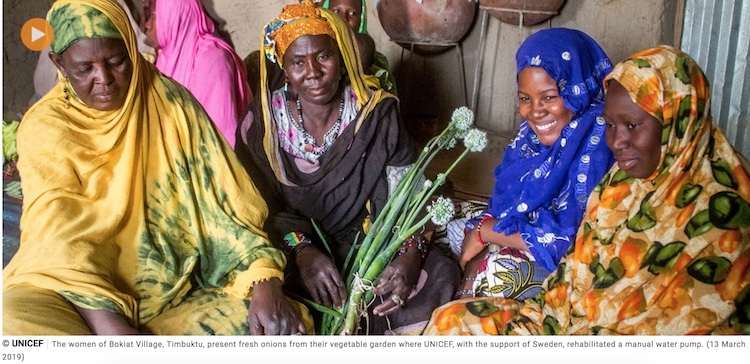By Sean Buchanan
NEW YORK (IDN) – The world’s people are demanding “transformative change that is fair and sustainable,” UN Secretary-General António Guterres said July 16, calling on government leaders to use key United Nations meetings in September to “kickstart a decade of delivery and action for people and planet.”
The key meetings are the Climate Action Summit, the Sustainable Development Goals Summit, a High-Level Meeting on Universal Health Coverage, a High-Level Dialogue on Financing for Development and a high-level review of commitments to small island developing States and their accelerated modalities of action pathway (SAMOA).
Guterres’ call for concrete action was the cornerstone of his address to ministers attending the July 9-18 High-level Political Forum on Sustainable Development (HLPF) – the main UN platform monitoring follow-up on States’ actions towards the Sustainable Development Goals (SDGs).
Guterres noted that the HLPF was “zeroing-in” on the power of SDG action “to support empowerment, equality and inclusion”, and urged the participants to “ratchet up the ambition and highlight the imperative of inclusion”.
“The evidence is clear: development is not sustainable if it is not fair and inclusive – and rising inequality hinders long-term growth,” he said.
Alongside the impacts of globalisation and rapid technological change, “inequality raises economic anxiety, erodes public trust, and undermines social cohesion, human rights, peace and prosperity”, according to the UN chief.
Meanwhile, “mounting evidence” illustrates the “transformative results of equality and inclusion”, particularly of women, in higher gross domestic product, greater stability, and enhanced private sector performance and institutional effectiveness, he pointed out.
“For all these reasons, the 2030 Agenda places the goals of inclusion, empowerment and equality, leaving no one behind at the heart of our efforts”, Guterres stated.
Yet, four years after its adoption, “we are not yet on track and must step it up”, he said, citing extreme poverty, inequality, global unemployment, gender inequality and climate change, among others. In all these areas, he recognised, “the poorest and most vulnerable people and countries will suffer the most”.
In her opening remarks, Inga Rhonda King, President of the Economic and Social Council (ECOSOC) said that countries had been mobilised around the 17 SDGs, voluntary national reviews had been shared by 142 countries, SDG progress had been tracked and children had spoken about the future they want.
While acknowledging the hard work of many countries, she argued that “we need to do more, to do it faster and to be more transformative”.
She urged participants to “understand how we can do better, advise each other and forge new partnerships”, noting that “our conclusions will reverberate in the September SDG Summit.”
UN General Assembly President María Fernanda Espinosa stressed the importance of addressing urgent challenges “as they pave the way for longer-term risks and opportunities”, including the need to be “fully inclusive” and to empower girls and women.
She also encouraged participants to use the September high-level week, at which time five summit-level meetings will be convened, “to be more ambitious and to announce accelerated measures and specific steps that respond to the urgency of the challenges we face”.
Those meetings “represent a key opportunity to demonstrate that multilateralism works – that it can deliver tangible benefits to people’s lives”, said Espinosa.
Mary Robinson, former president of Ireland and a former UN High Commissioner of Human Rights, told the meeting that, together with the Paris Agreement on climate change, the 2030 Agenda is one of the “most important diplomatic achievements of this century.”
She called them “tangible proof of the benefits of multilateralism and a rebuke to the narrow agendas of nationalism, isolationism and self-interest.”
However, she said, “we can no longer afford to regard the 2030 Agenda and the Paris Climate Agreement as voluntary,” citing a UN report in May detailing the loss of biodiversity and potential extinction of one million species and stressing that full implementation of both reports has become imperative “to secure a liveable world for our children and grandchildren”.
Hoesung Lee, Chair of the Intergovernmental Panel on Climate Change (IPCC), told the meeting that “climate action and sustainable development are inseparable” and presented three points of linkages between the two.
First, “the current warming is already producing negative impacts on natural and human systems, seriously impeding progress toward some SDGs”. Second, the “ambitious” climate goal of limiting global warming to below 2 degrees Celsius “creates a trade-off for some SDGs and balancing the goals will be a challenge”. And, third, while climate actions produce “new opportunities for the economy, environment and society”, they are contingent on “international cooperation, with social justice and equity being core aspects of climate-resilient development pathways”.
Lee called for collective efforts “at all levels”, to limit global warming to 1.5 degrees Celsius, which should take into account equity and effectiveness, “to strengthen the global response to climate change and achieve sustainable development and poverty eradication”.
“The result will be a cleaner, sustainable, more productive, and stronger global economy”, he concluded. [IDN-InDepthNews – 17 July 2019]
Photo credit: UNICEF
IDN is flagship agency of the International Press Syndicate.
facebook.com/IDN.GoingDeeper – twitter.com/InDepthNews
Send your comment: comment@indepthnews.colo.ba.be
Subscribe to IDN Newsletter: newsletter@indepthnews.colo.ba.be

